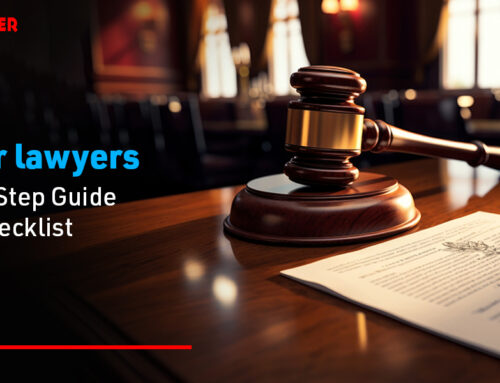So, you have created your social media channels with a positive intention of staying connected with your customers. Instead, people are expressing their dissatisfaction & spreading negativity about your products & services. It’s time to create a robust online reputation management strategy to safeguard your brand identity and online presence.
Why?
Because your online brand reputation (ORM) determines how many people will buy your product or service.
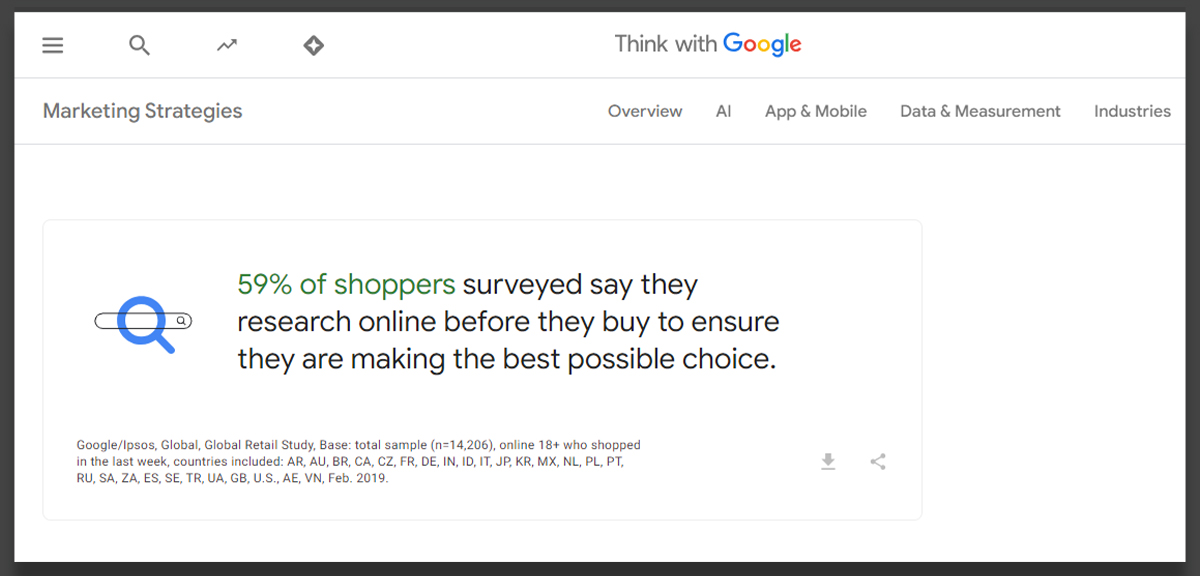
More than 59% of shoppers said they perform online research before purchasing. When we have to buy something, we always refer to search engine results, especially Google.
For things as simple as going to a restaurant to eat out, we check the number of restaurants, ratings, reviews, negative comments, positive reviews, how recent they are, etc.
It takes 20 years to build a reputation and five minutes to ruin it. If you think about that, you’ll do things differently.
– Warren Buffet
So, we all know that protecting your brand with a positive online reputation is necessary for your business to grow, attract potential leads, and earn revenue.
Let’s read further to know how it works.
What is Online Reputation Management (ORM)?
With Online Reputation Management (ORM), you can monitor, influence, and improve how individuals or businesses perceive your business online or you as an individual.
It is a process that shapes and protects your online image, ensuring that the information about you or your business is accurate & builds trust with your audience. It also empowers you to control what people say about you online.
Brand reputation management involves managing negative content for your brand and responding to customer feedback to resolve issues before they damage your brand or your customer’s reputation.
One of the most important aspects of online reputation management is minimizing negative search results and emphasizing positive ones.
Why Businesses Should Manage Their Online Reputation?
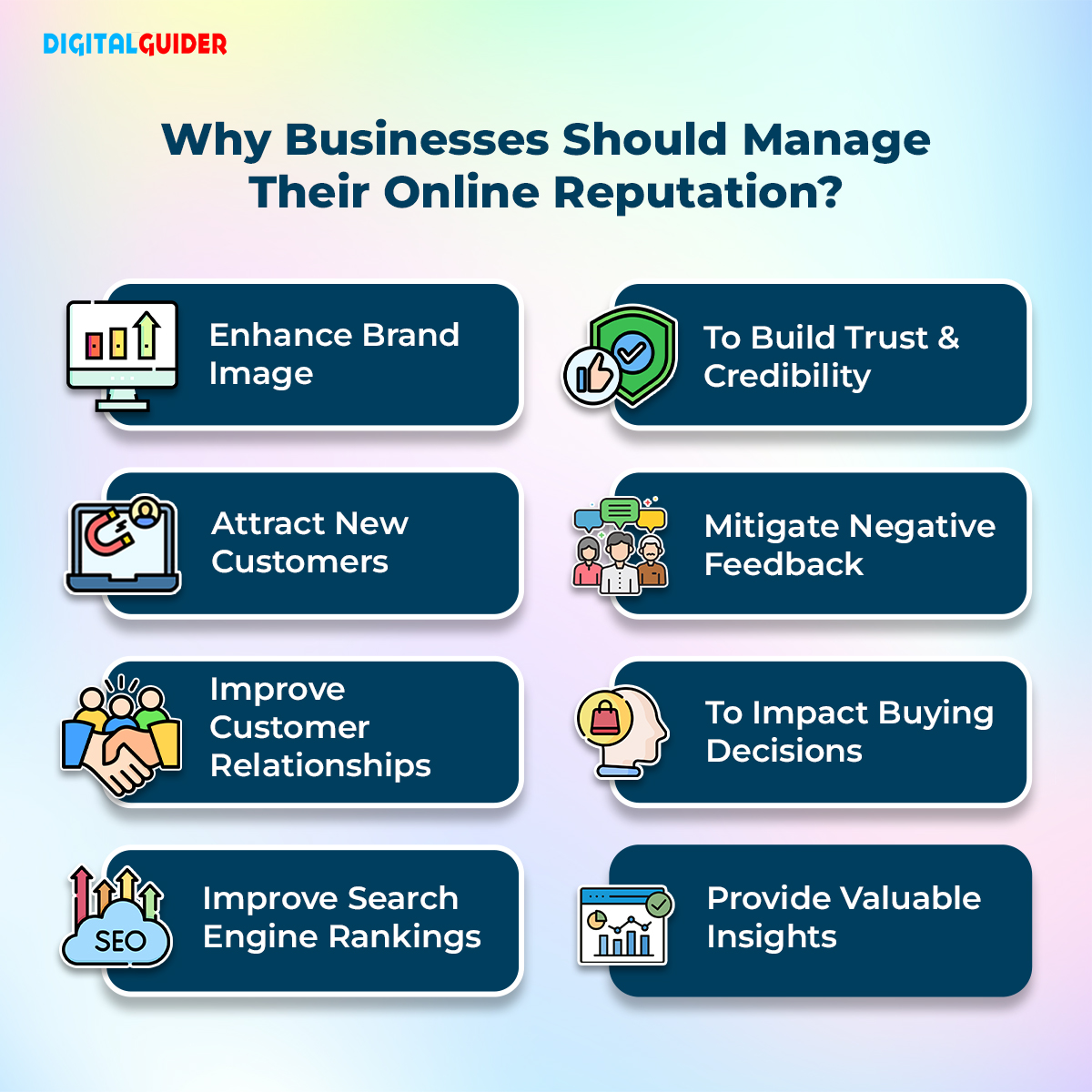
Businesses should actively manage their online reputation for several key reasons:
— ORM Enhance Brand Image
A well-managed online reputation promotes a positive brand image and portrays your business in a favorable light. This can increase brand loyalty and customer advocacy, where satisfied customers recommend your business to others. It enhances your online presence and attracts more people to your website. Your website and social media accounts are more likely to show at the top of search results when customers search for terms related to your business.
— Build Trust & Credibility
People rely on reviews and information online to evaluate a company’s credibility and trustworthiness. A brand reputation with the highest positive reviews and feedback can help you persuade potential customers that your company is trustworthy and provides high-quality products or services.
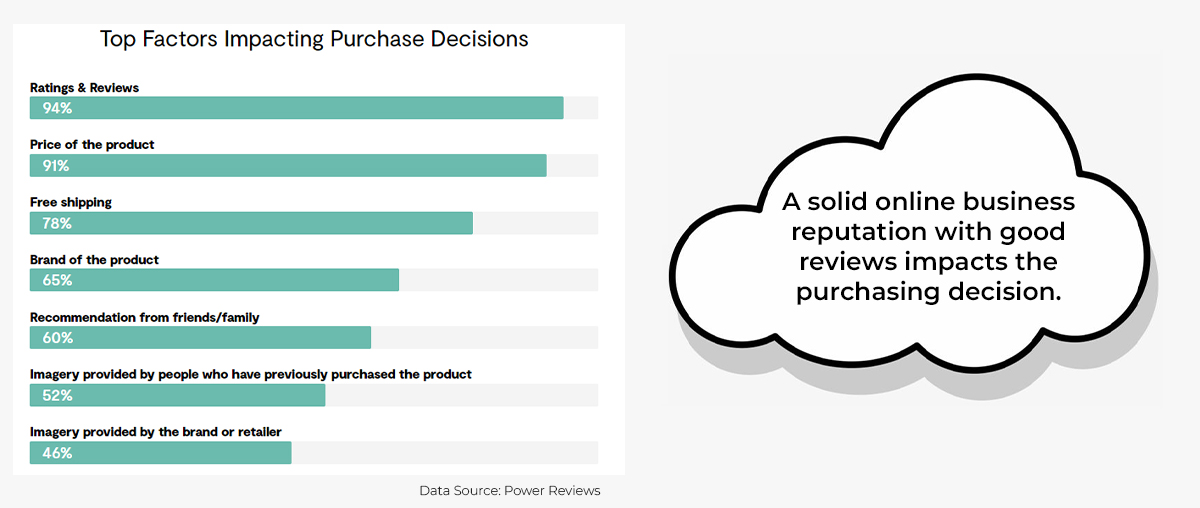
Source: Power Reviews
A solid online business reputation with good reviews and feedback can help you develop trust and credibility with your target audience & impact the purchasing decision.
— Attract New Customers
Positive reviews and a robust online reputation can boost your visibility in search engine results and social media platforms. This increased visibility attracts new customers likelier to choose your business over competitors with a weaker online presence.
— Mitigate Negative Feedback
Although receiving negative feedback is unavoidable, you can lessen its effects and show dedication to customer satisfaction by handling it professionally and promptly. Consumers who had their social media complaints resolved in less than five minutes tended to spend more on future purchases.
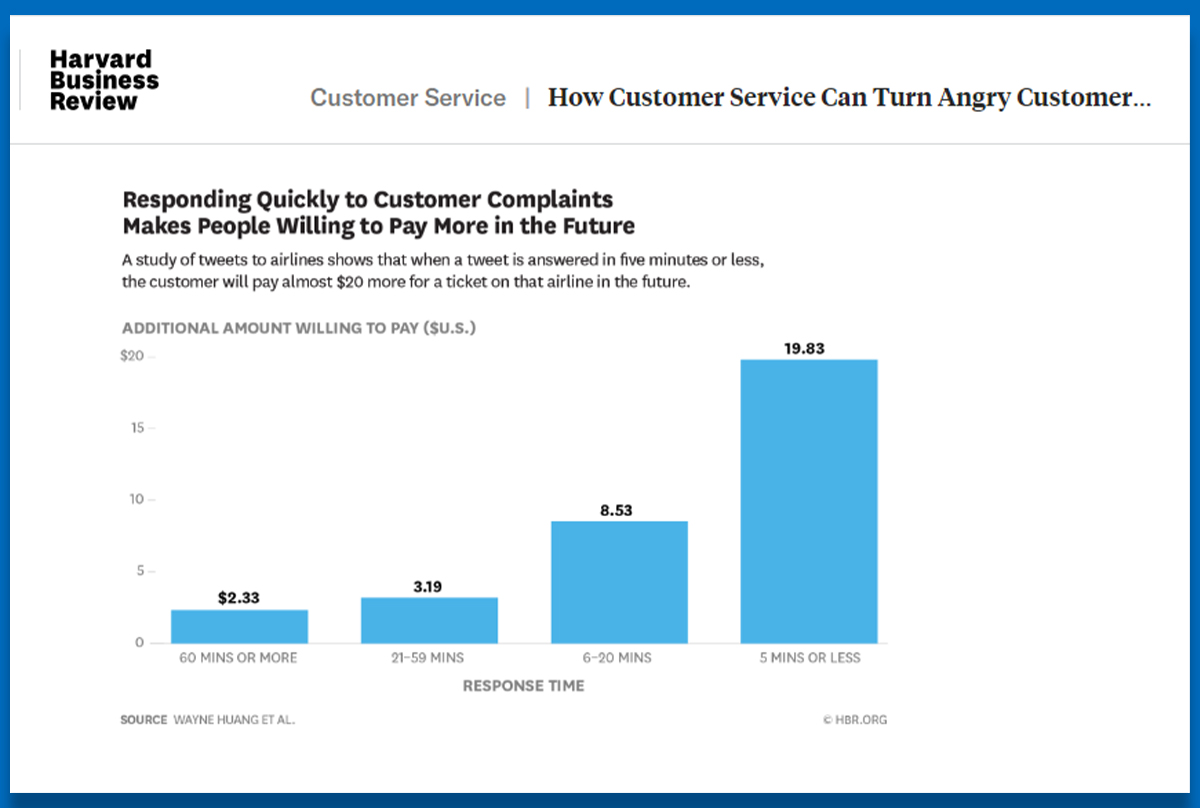
— Improve Customer Relationships
Engaging with customer reviews and feedback online allows you to promptly address concerns, demonstrate responsiveness, and build stronger customer relationships. This personalized approach fosters trust and can turn negative experiences into positive ones.
— To Impact Buying Decisions
59% of shoppers said they perform online research before making a purchase. And 94% of consumers check product reviews before buying. So, you could lose customers based on how your brand appears online.
Additionally, brands should consistently deliver on their promises and provide a high-quality customer experience. Positive word-of-mouth generated by satisfied customers contributes to a strong online reputation.
— Improve Search Engine Rankings
Online reputation is one of the most crucial ranking factors for search engines like Google. A positive internet reputation can aid in the improvement of your search engine rankings. When people search for keywords related to your business, your website will likely appear at the top of the search results. An excellent online reputation and good reviews and feedback can increase your search engine ranking and website traffic.
— Provide Valuable Insights
Analyzing online reviews and feedback can provide valuable insights into customer sentiment and satisfaction. This information can improve your products, services, and overall customer experience.
What Are The Components Of Online Reputation Management?
Online reputation management (ORM) is a comprehensive strategy that involves various components to monitor, build, and maintain a positive digital image for individuals, brands, or organizations. Here are the essential elements of online reputation management:
— Content Management:
Content that resonates with the target audience is essential for building a solid online reputation. Develop and share positive, relevant, and engaging scannable content across various online channels & implement strategies to ensure positive content ranks high in search engine results, pushing down harmful content. Businesses can position themselves as industry experts and thought leaders by sharing knowledge, insights, and thought leadership content.
— Monitor Feedback Thoroughly:
Actively soliciting customer feedback through surveys, reviews, or testimonials helps build credibility and demonstrates transparency. Keep track of brand mentions, comments, and discussions across popular social media platforms. Regularly check and respond to reviews on Yelp, Google Reviews, and industry-specific review sites.
Also, stay informed about media coverage that might impact your brand. Analyzing the data collected from social listening allows brands to gain valuable insights into customer sentiment, identify areas for improvement, and proactively address potential issues.
Also Read: Off Page SEO Essentials: A beginner’s guide to promote your website
— Review & Reputation Building:
Positive customer reviews boost the brand’s reputation and serve as valuable social proof for potential customers. Encourage satisfied customers to leave positive reviews. Showcase positive customer testimonials on your website and marketing materials. Identify and engage advocates who can positively influence your online reputation.
— Social Media Management:
Maintain consistent and professional profiles across social media platforms. Actively engage with followers, respond to comments, and address customer concerns promptly. Develop a content calendar and post strategically to maintain a positive online presence.
— Influencer Relations:
Explore & identify influencers relevant to your industry and build relationships with them. Collaborate with influencers to promote positive content and endorsements.
— Competitor analysis:
Staying informed about competitors’ online reputations is crucial for maintaining a competitive advantage. Regular competitor analysis allows businesses to benchmark their online reputation against their competitors.
— Crisis Management:
Develop a crisis management plan outlining steps to take in case of negative incidents. Respond promptly to any emerging issues to mitigate potential damage. Communicate transparently during a crisis to maintain trust with your audience.
— Analytics and Measurement:
Use analytics tools to measure the impact of your ORM efforts. Track KPIs such as sentiment analysis, online mentions, and engagement rates.
— Continuous Improvement:
Regularly reassess and adapt ORM strategies based on changing trends and feedback. Use positive and negative feedback to improve your online reputation management approach continuously.
Best Practices To Build A Positive Online Reputation
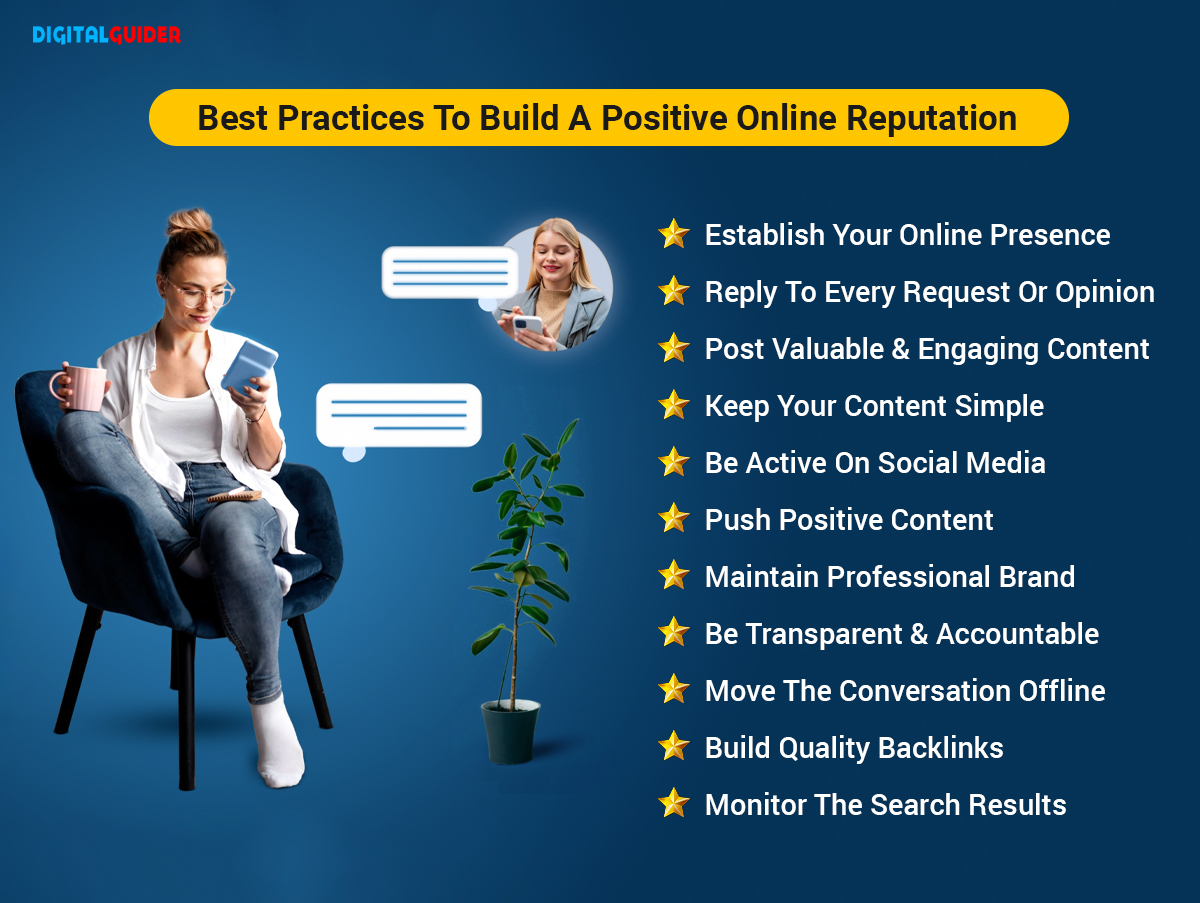
— Establish Your Online Presence
An established online presence is essential for effective reputation management. With your website and social media profiles, you can control the narrative about your business by sharing your story and values.
You can directly engage with customers to address concerns and build loyalty. Optimizing your online presence for search engines improves discoverability, increases exposure, and conveys credibility. You can also highlight your strengths and critical successes to shape perceptions. Optimizing your website is essential to establishing a robust online presence.
For example, if you have an eCommerce website, having a user-friendly, visually appealing, fast-loading, & responsive website can significantly impact your customer’s online shopping experience. You can create a scalable and adaptable website that supports your company’s objectives by picking the appropriate eCommerce platform and the best ecommerce development services.
— Reply To Every Request Or Opinion
It is essential to show your current or potential clients that your business is accessible and treat people respectfully. For this reason, you should respond to every online message or review. If someone’s comment is negative, you will probably avoid conflict and spreading wrong opinions by writing a polite and understanding answer.
You shouldn’t ignore the positive posts as well. The best is to take advantage of them and proudly share them on your social media profiles. It would be a great proof of the quality of your services or products.
Before responding to any message, ensure you have enough time. Writing an answer in a rush will only worsen the situation and your image.
— Post Valuable & Engaging Content
Share EEAT-based blog content, photos, videos, or other content highlighting your skills, knowledge, and personality. Posting regularly keeps your profiles active and gives people a reason to connect with you. Focus on being genuine by sharing things you care about. People will appreciate your authenticity.
— Keep Your Content Simple
If you fill in some sections on your website or write a post on your blog, Facebook fan page, or Twitter account, try to use normal language. Your every written expression should also be honest and (especially in the case of messages and e-mails) polite.
— Be Active On Social Media
A social media profile is a must when you would like people to find your business. While they seek information, they don’t stop at the search engine. Checking restaurants, hotels, or advertising agencies on Facebook is often the first thing potential clients do before deciding on a particular offer.
Post interesting and entertaining content on your fan page to engage your followers. Utilize all social media profiles, including Facebook, Twitter, Instagram, LinkedIn, and YouTube. These sites have high domain authority and will almost always rank for brand searches.
In every account, try to respond to comments, pin other people’s work, or show some interest in certain publications. That’s how building relationships begins, which your business will benefit from.
Also Read: Get More Real Instagram Followers -15 Ways
— Push Positive Content
Promote positive press, reviews, or mentions of you and your business. Share them on your social media profiles, website, and email newsletters. The more these rank in searches and get shared, the more they push down any negative results. You can also do interviews, start a podcast or vlog, and get contributors to post on your behalf. New, optimized content is vital.
— Maintain Professional Brand
Have a consistent voice, image, and style across your website and social media profiles. Double-check that all information is up to date, including contact information, services or products, staff bios, and branding. Your online reputation depends on people being able to find the latest accurate information about you easily. Consistency and professionalism make an excellent impression.
— Be Transparent & Accountable
Don’t make excuses or cast blame on others. Acknowledge any mistakes or shortcomings on the part of your business. Explain how you will resolve the issue and prevent similar problems going forward. Your transparency and accountability will build credibility and trust with the reviewer and anyone else who sees the exchange.
— Move The Conversation Offline
Rather than hashing out all the details of a negative interaction in public, ask the reviewer to contact you directly via phone or email. Explain your desire to resolve the matter privately and provide them with your contact information. Once communication moves offline, you have the opportunity to address their concerns personally and come to an agreement together. You can then post a follow-up message on the public forum reaffirming your commitment to making things right.
— Build Quality Backlinks
Get reputable websites to link back to your site. Guest post on industry blogs, do interviews, use barnacle SEO techniques and suggest they link to your site. Backlinks from authoritative sites pass “link juice” to your page, boosting its ranking. But focus on quality over quantity. A few good backlinks are better than many poor-quality ones.
— Monitor The Search Results
Regularly check what comes up when you search for your name and company to see your online reputation. Look for any negative reviews or press and address them. But also look for opportunities to build on the good stuff. See what’s ranking well and find ways to promote that content even more. Monitoring search results should be an ongoing part of your reputation management strategy.
How Does ORM & SEO Boost a Brand’s Conversion Rate?
Search engine optimization (SEO) and online reputation management (ORM) are essential elements that significantly impact a brand’s image & enhance the conversion rate.
One of ORM’s primary goals is actively managing and suppressing negative content in search results. Effective SEO strategies promote positive content to appear higher in search rankings. This involves a continuous effort to create and optimize content that showcases the individual, brand, or organization in a positive light.
The combination of a robust online brand reputation, managed by ORM practices, and the visibility generated through search engine optimization (SEO), creates a solution that directly impacts a brand’s conversion rate.
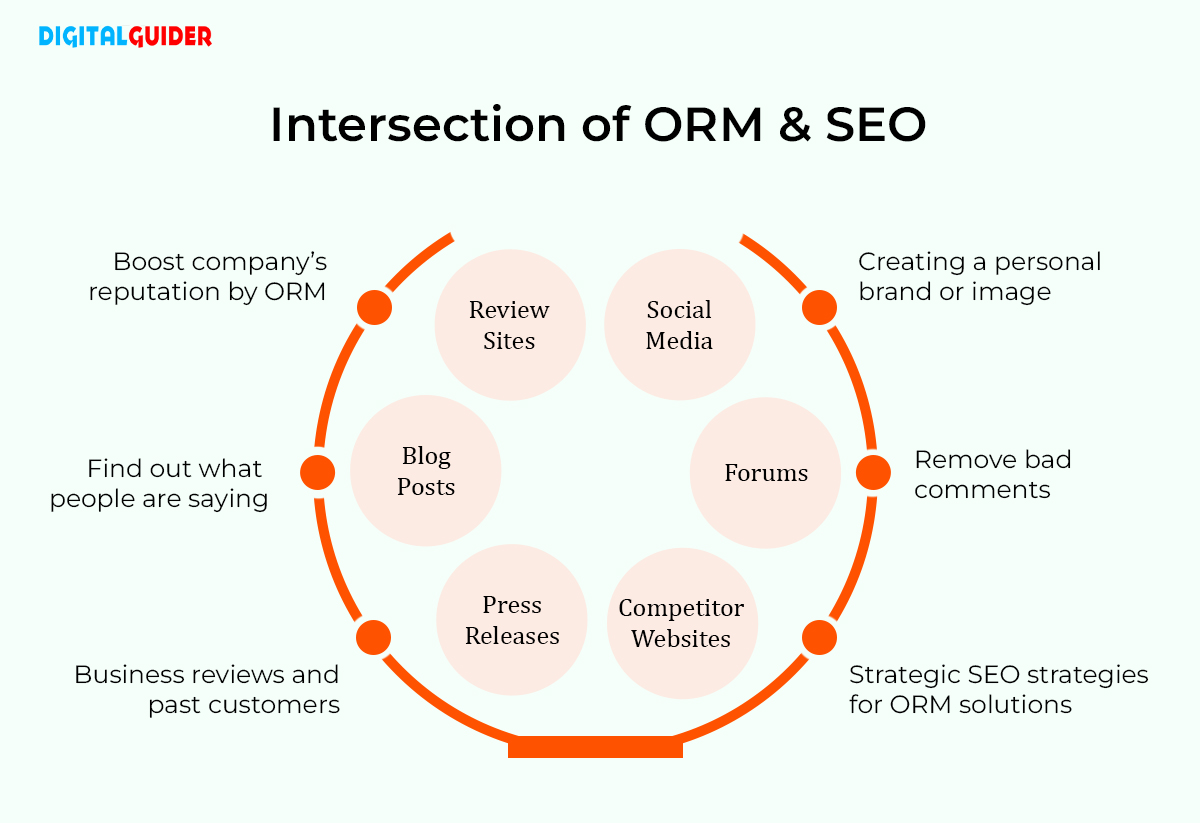
Search engine algorithms consider various reputation signals when determining the relevance and credibility of content. Positive online reputation, as reflected in reviews, social media interactions, and authoritative mentions, can positively influence how search engines rank content.
Additionally, local SEO becomes crucial for businesses with physical locations, with positive reviews, accurate business information, and local citations contributing to a positive online reputation and local search visibility. As you can see in the example below, how positive reviews affect a brand’s ranking.
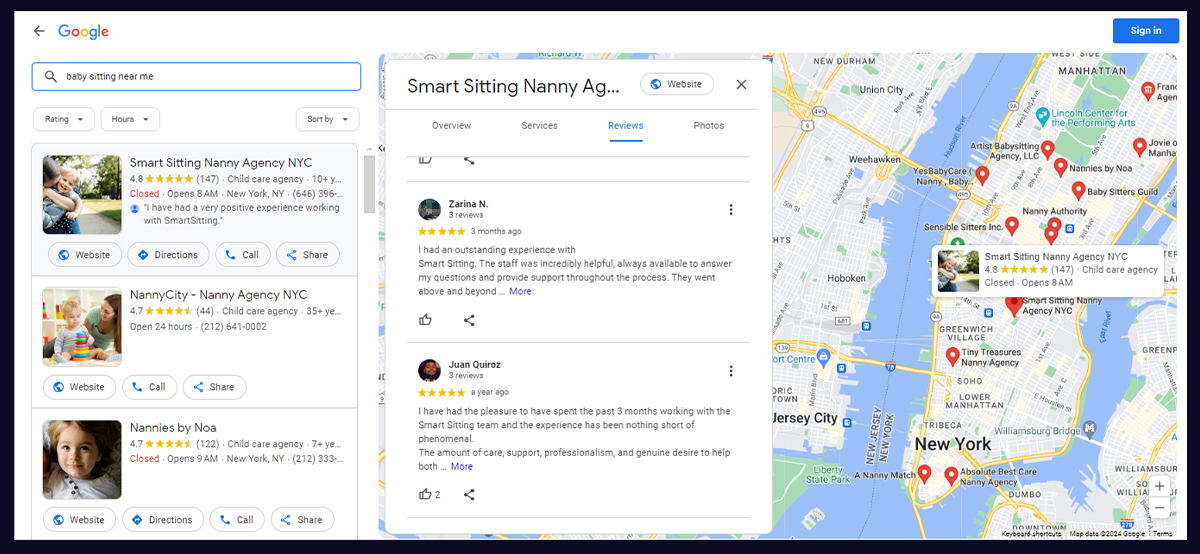
The relationship between ORM and SEO is dynamic. It forms a comprehensive approach to managing and improving the digital perception in search engine results, ultimately contributing to a positive brand image & boosting conversions.
Wrapping Up: Protect & Enhance your Online Reviews Management
In the digital world, your online image is crucial. Negative search results harm, while positive ones elevate your business. Online reviews can make or break a reputation. Whether big or small, brand reputation is vital. Invest time in online reputation management (ORM) to attract customers and foster loyalty.
Digital Guider reputation management experts can help you gain more positive reviews and address any negative ones. We set up review profiles for your business on sites like Google and Facebook.
Our experts also offer review monitoring to alert you anytime new reviews are posted. For negative reviews, we can draft post-professional, empathetic responses to help mitigate any potential damage. A positive brand reputation has a domino effect—others are likely to follow once one praises. Don’t wait; initiate your efforts to shape a favorable online presence.



